(Clearwisdom.net) The final round competition of the 2nd NTDTV International Chinese Culinary Competition was held on the evening of September 21, 2009, at the Lighthouse in Chelsea Piers, Manhattan. Eleven chefs won the gold, silver, and bronze prizes at an awards ceremony held on the evening of September 22.
Chefs attending this competition had a high caliber of culinary techniques. Judge Chen Yongming said, "Many contestants cooked with traditional methods. NTDTV's competition help people learn authentic Chinese culinary culture and help them retrieve what has been lost."
The final competition stipulates that each contestant create three dishes to serve about ten people: one is required and the other two are self-selected. They should taste differently from the dishes in the preliminary competition.
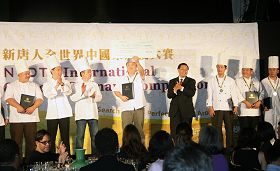
Eleven chefs won gold, silver, and bronze prizes at the 2nd NTDTV International Chinese Culinary Competition
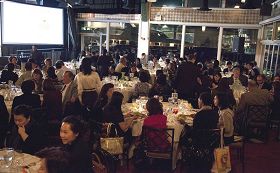
Awards banquet for the International Chinese Culinary Competition on the evening of September 22, 2009
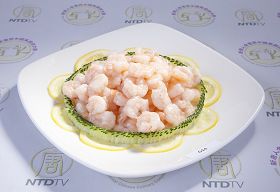
Gold-prize winner Hua Zhang's self-selected dish "Crystal Shrimp" for the final competition in the Huaiyang cuisine
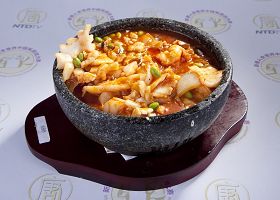
Bronze prize winner Ping-Wen Chen's self-selected dish "Rice crust and three delicacies" for the final competition in Sichuan cuisine. The squid was cut like a comb, a technique used in the Ming Dynasty
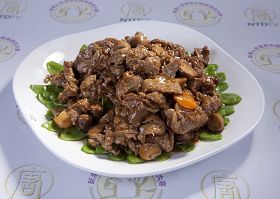
Bronze prize winner Wing Kuen Wong's self-selected dish "Beef with oyster sauce" for the final competition in the Cantonese cuisine
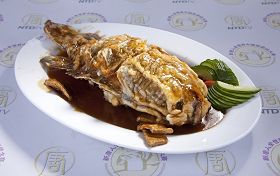
Bronze prize winner Ze Zheng's required dish "Sauce-glazed fish" for the final competition in the Shandong division.
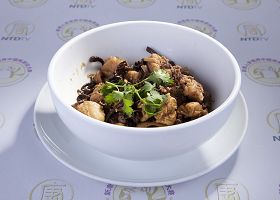
Bronze prize winner De Gui Yan's required dish "Chicken Mushroom Stew " for the final competition in the Northeast regional cuisine
The competition carries forward China's profound culinary culture
President of NTDTV Zong Li said that China's culinary techniques and artistic skills have a long history, which has been passed down by famous chefs of different dynasties and formed different types of cuisines. The most influential cuisines include Sichuan cuisine, Shandong cuisine, Cantonese cuisine, Huaiyang cuisine, and Northeastern cuisine. These types of cuisines represent traditional Chinese culinary techniques, featuring color, aroma, taste, and presentation. The culinary competition aims to promote traditional Chinese cuisine, carry forward China's profound culinary culture, explore traditional methods of cooking, and redisplay the profoundness of Chinese food, so that the world's people will gain a deeper understanding of the characteristics of Chinese cuisines and cherish the treasure of Chinese culinary culture.
The competition returns to tradition, displays authentic cooking techniques
Bronze prize winner Ping-Wen Chen demonstrated his unique skill in his self-selected dish "Rice Crust and three delicacies." He cut squid as if it were a comb. The judge, Chen Yongming, said, "It was a cutting method used in the Ming Dynasty. Since in the Ming Dynasty, there were no sharp knives and transportation was slow, only by cutting meat into such a small slice (like a comb) could the meat be frozen and kept fresh while being delivered to distant places."
Skillful Chefs: Traditional technique is the fundamental

Contestant at the final competition
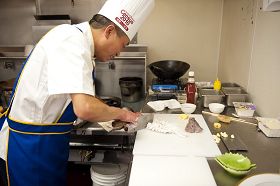
Contestant at the final competition
Bronze prize winner Tiger Xue in the Huaiyang division learned traditional cooking techniques from Huaiyang cuisine master Quansheng Xue. Mr. Xue said that the competition grasps the essence of Huaiyang regional cuisine. The required dish in the preliminary round, "Pickle Mustard Green with Bean Curd Sheet and Green Soybean," is a homemade dish in the Huaiyang area, but producing a pleasant taste is really a test for a chef's level.
Bronze prize winner Ze Zheng in the Shandong cuisine is chief cook of a casino in Las Vegas. He said that, no matter how a type of cuisine develops, the traditional cooking techniques are fundamental, which must be persevered, otherwise, the characteristics of the cuisine would be lost. He said that, in order to learn how to cook the Shandong regional cuisine, he has studied local customs and history in the Shandong area.
Gold, silver and bronze prize winners of five types of Chinese cuisines at the 2nd NTDTV International Chinese Culinary Competition were announced at 9:00 p.m. on September 22:
Sichuan division
Gold Prize: vacant
Silver Prize (2 persons): Tzu-Min Liu and Yi Jiang, each awarded a silver trophy; $3,000; and a certificate of recognition
Bronze Prize: Ping-Wen Chen, awarded a bronze trophy; $1,000; and a certificate of recognition
Honorary mentions (5 persons): Zhan Tong Lin, Jian Fang, Chin Li Wann, Cheng Zhou Bai, and Hui Da Li, each awarded a certificate of recognition
Shandong division
Gold and Silver Prizes: vacant
Bronze Prize (2 persons): Ze Zheng and Ke Jiang Bi, each awarded a bronze trophy; $1,000; and a certificate of recognition
Honorary mentions (3 persons): De Xian Lin, Guang Ying Xie, and Zhi Hao Li, each awarded a certificate of recognition
Cantonese division
Gold and Silver Prizes: vacant
Bronze Prize (2 persons): Pang-Chuan Liu and Wing Kuen Wong, each awarded a bronze trophy; $1,000; and a certificate of recognition
Honorary Mentions (4 persons): Hongzhen Da, Xin Kang Zhou, Ren Miao Zheng, and Guo Rong Li, each awarded a certificate of recognition
Huaiyang division
Gold Prize: Hua Zhang, awarded a gold trophy; $10,000; and a certificate of recognition
Silver Prize: Chieh-Chung Yu awarded a silver trophy; $3,000; and a certificate of recognition
Bronze Prize: Tiger Xue, awarded a bronze trophy; $1,000; and a certificate of recognition
Honorary Mentions (3 persons): Ming Zhang , Shunli Qiu, and Hongyi Wang, each awarded a certificate of recognition
Northeastern division
Gold and Silver Prizes: vacant
Bronze Prize: De Gui Yan, awarded a bronze trophy; $1,000; and a certificate of recognition
Honorary Mention: Jerry Wen, awareded a certificate of recognition





